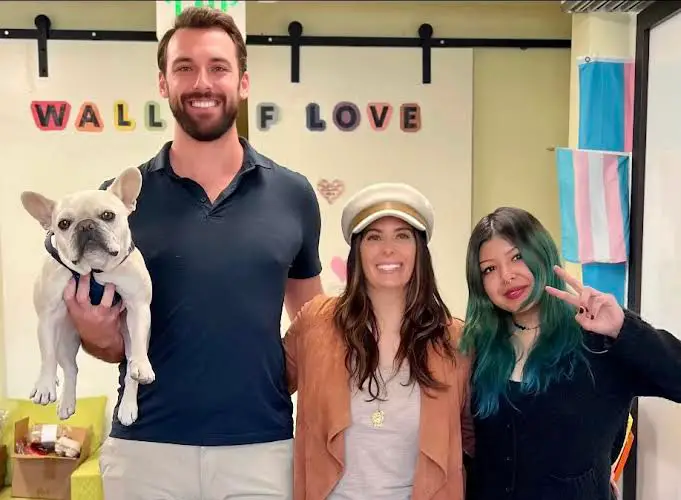OCEANSIDE — For the past five years, the North County LGBTQ Resource Center has spearheaded an effort to house teenagers and young adults who have been pushed out of their family homes due to their sexual orientation or gender identity.
Through the Unicorn Homes program, the center partners with individuals and families who open their homes to provide crisis and transitional housing to LGBTQ youth between the ages of 14 and 24 who are either homeless or at risk of homelessness.
According to the center, approximately 40% of homeless youth in California identify as LGBTQ. In most cases, they are homeless due to their family rejecting them over their sexual orientation or gender identity.
Unicorn Homes aims to provide temporary housing with the end goal of preventing homelessness, reuniting families, rectifying problems or helping youths establish independence and stability to live on their own.
According to Unicorn Homes Director Jennifer Ianoale, the program previously saw more reunification cases with minors who came through the program. In these circumstances, she explained, the parents needed more education and resources to understand and care for their children.
“We talk to families and try to figure out what’s going on – hear their side – and work with therapists, provide education and help them understand what resources they have,” Ianoale said.
If minors could not reunite with their families, the center would work with Child Protective Services.
Since the COVID-19 pandemic, the program has begun to serve more clients between 18 and 22.
“In many of these cases, the youth have already come out as being nonbinary or transgender, and their families are not supportive of them beginning their transition,” Ianoale said. “They don’t want to see that, so they begin kicking these kids out because they’re already considered to be adult-aged and don’t need to live with them anymore.”
Many of these older unicorn youths have not learned the necessary skills to live independently. On top of that, with scarce affordable housing in the region, these youths often end up homeless.
Many Unicorn Homes participants have also experienced verbal and physical abuse from their families, so reunification is not always safe for them.
Beyond providing housing, Unicorn Homes also offers paths to mental health resources, job readiness, life coaching and independent living skills, and resources like bus passes, clothing and food.
“I check in with them weekly, and we set goals like working towards a GED or applying for a certain number of jobs,” Ianoale said. “For some, they don’t have a lot of the adult life skills which could be due to trauma or because they weren’t taught them – some are coming from very religious households where most of the learning was based on religion, which is why they were rejected in the first place.”
As the participants adjust to life in their host home, Ianoale watches as their shyness eventually begins to chip away and reveal their true personalities.
“At first they would be shy, insecure and would avoid eye contact,” Ianoale said. “Then once they’ve begun to come into their own, start taking hormones and wearing the clothes they wanted while living in a safe, stable home, they would start to make more eye contact and start speaking up for themselves. It’s beautiful to witness.”
The program’s network of 12 host families spans across the San Diego region – from as far south as Bay Park to as far north as Oceanside – and provides between two weeks to 12 months of stay for a participant, depending on their availability. Each family has undergone a vetting process, including a background check and a home inspection by Ianoale.
Branden Clemens first learned about the Unicorn Homes program last year. As a real estate developer working to provide affordable housing for low-income households, veterans and students, he was interested in working with the center to develop some form of transitional housing for homeless LGBTQ individuals.
Real estate is a slow-moving process, so he wanted to help out sooner by becoming a Unicorn Home host.
Clemens hosted 22-year-old Aerth, who grew up in North County and was previously homeless. The two had similar interests in spirituality and astrology and developed a good connection.
Aerth stayed with Clemens for four months until he discovered he needed spinal surgery. Once completely healed, Clemens intends to become a Unicorn Home host again.
Clemens checks in with Aerth, who is living with a partner, from time to time.
“Unicorn Homes is a great program to help combat a really serious issue that we face in America,” Clemens said. “Housing unaffordability is at an all-time high… this is a great way for people who have the extra space in their homes and hearts to really open up and provide someone with that extra helping hand to better their life.”
Clemens encouraged other families to participate.
“This is an awesome opportunity for more people to get involved,” Clemens said. “The state has even noticed and recognized the program as a way to help the homeless.”
Currently, the program is one-of-a-kind in the region. It is funded by local and state dollars, including $78,767 over two years from the city’s Measure X funds and $35,000 annually from the California Governor’s Office of Emergency Services. Both budgets include personnel and operating costs for the program.
Measure X is a half-cent sales tax initiative that voters passed in 2018 to generate funds to enhance the city’s public safety and infrastructure while also addressing homelessness.
Assemblymember Tasha Boerner authored Assembly Bill 589, which could have established the “Unicorn Homes Transitional Housing for Homeless LGBTQ+ Youth Program (Unicorn Program)” as a pilot program to be run by organizations like the North County LGBTQ Resource Center in San Diego and Sacramento Counties. The program could have funded the center to help other organizations like the San Diego LGBT Resource Center run their own Unicorn Homes.
Gov. Gavin Newsom vetoed the bill on Oct. 7 due to the state’s ongoing financial concerns following the $31 billion budget shortfall earlier this year.
“While I appreciate the author’s commitment to providing housing for homeless LGBTQ+ youth, AB 589 creates an unfunded grant program that must be considered in the annual budget in the context of all state funding priorities,” Newsom’s statement reads.




